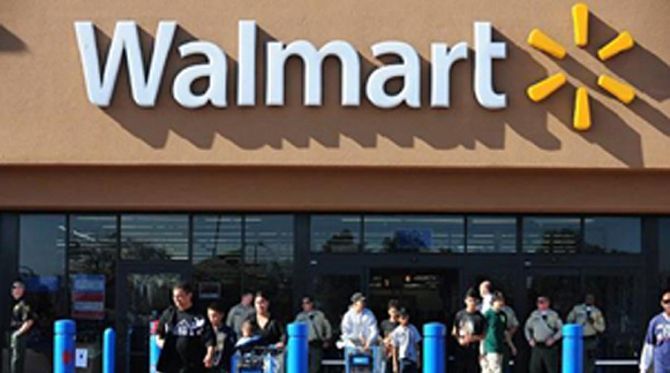'"We want to get the learnings from Flipkart and take it to other parts of the world," Walmart CEO Doug McMillon was quoted as saying.'
'That is a very large tuition fee for an MBA in a country that outdoes Brazil and perhaps even China in busting multinationals' knees and sometimes their heads as they try to crack a market of mostly impoverished people run by a government that has never really given up the sadistic pleasures of administering the license raj,' notes Rahul Jacob.

Trying to make sense of Walmart's international strategy has been akin to trying to solve a giant Rubik's Cube where the colours move according to the whims of a prankster's bidding.
In the past few months alone, the two buyout firms bidding for Walmart's 540 stores in Brazil discovered a huge tax liability in the company's local business while doing their pre-acquisition due diligence.
The amount? In excess of $3 billion, according to a Reuters expose, the result of hefty back taxes in two different provinces in that country.
While it's true that Brazil might finish a close second to India's tax complexity, the problem also appears to be Walmart's proprietary management software that could not adapt to the web of retail taxes in Brazil.
In any event, one can't help wonder why the two financial firms bidding for a money-losing business with revenues of almost $10 billion discovered this giant tax liability at such a late stage.
Late last month, Walmart signed off on a deal to sell the British supermarket chain it acquired in 1999 for roughly the same price that it paid nearly 20 years ago.
To be fair, that business made good profits till the UK supermarket business became overly crowded in the past few years, which explains why the business is being sold for 11 times the operating profits in 2018, compared with Walmart's acquisition price of 18 times operating profits in 1999.
It is this track record of brash blundering overseas while running such an efficient business in the US from Bentonville that makes Walmart such a bewildering case study of corporate schizophrenia.
Little wonder then that the common thread through the many analysts' reports on Walmart investing $16 billion in Flipkart is bewilderment.
In a note entitled, 'Last penalty WMT should pay for being slow?' analysts at Bernstein characterised the acquisition price to sales multiple of 5-7x as 'silly'.
Walmart paid a similar multiple while paying $3 billion for a fast-growing US online retailer called Jet.com; after the acquisition delivered an initial turbo boost to Walmart's online sales, Walmart is falling further behind in playing catch-up to Amazon at home.
Instead of concentrating on that big task in the US, it has opted to enter a race with Amazon in India. 'We also did not hear a clear strategy statement about what WMT would do or not do with Flipkart that would allow them to win or keep pace with Amazon,' Bernstein said.
It is reassuring to hear such candour from seasoned analysts just off a conference call with management because Walmart's CEO Doug McMillon has spoken a couple of times about the value of buying Flipkart, but your guess is as good as anyone else's on why they will succeed online after their brick and mortar ambitions have amounted to so little, admittedly also because of perverse Indian government regulations.
'We want to get the learnings from Flipkart and take it to other parts of the world,' McMillon was quoted as saying.
That is a very large tuition fee for a master's in business administration in a country that outdoes Brazil and perhaps even China in busting multinationals' knees and sometimes their heads as they try to crack a market of mostly impoverished people run by a government that has never really given up the sadistic pleasures of administering the license raj.
Walmart's accident-prone attempts to open bricks and mortar retail stores in this country, which they wisely gave up on a few years ago, ought to have been a costly enough lesson.
Scan the tables of global online sales put out by Forrester Research, Euromonitor and investment banks and it becomes immediately apparent that only two countries would merit the absurd 16 billion dollar bet that Walmart has just made: They are predictably China and the US, who together account for 80 per cent of global e-commerce transactions.
Walmart already has well over 400 stores in China and an online presence too through a very efficient local grocery delivery and logistics company.
In the US in the past few years, it has begun to make amends for not recognising early on the challenge e-commerce would pose by convincing Marc Lore, the founder of Jet.com, to head its online business.
By buying a majority stake in Flipkart, Walmart risks undermining its much larger business at home chasing what is by US and Chinese standards a tiny middle class in India with limited purchasing power for the foreseeable future.
'This investment will pull management attention from the US market at a time when competition has never been tougher,' note analysts at Morgan Stanley.
They concluded that Walmart would have been better advised to increase its collaboration with Google in e-commerce and focus on combating Amazon in their home market, which still accounts for three-quarters of Walmart's earnings before interest and taxes and two-thirds of their revenue.
Instead, by betting big on India and Flipkart whose losses are in excess of $1 billion annually, Walmart is setting itself up for huge write-downs.
Called 'goodwill' in accounting terms to account for acquisitions gone wrong, the term is a decorous euphemism for corporate hubris and naivete.
Walmart last month has shown both in abundance.











